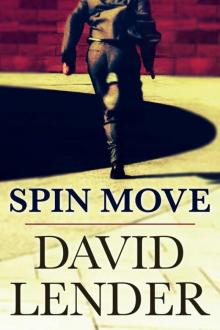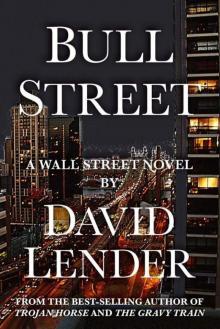- Home
- David Lender
Arab Summer Page 2
Arab Summer Read online
Page 2
Sasha felt as if someone were clamping his hands around her heart, squeezing it. She again looked into Christina’s eyes, at her dilated pupils, and saw only the opium. “You don’t care,” she said and ran from the room. She descended the stairs and burst out onto the patio.
A few minutes later, sitting on the railing and staring off at the house, she saw Christina behind the French doors inside the library. Christina posed as was her way, one arm across her stomach, her hand cupping the other elbow as she held her cigarette aloft. She took a long pull on her cigarette, then arched her chin upward and spewed a geyser of smoke at the ceiling. She seemed to hesitate, then opened one of the French doors and stepped out onto the patio.
“Don’t think I don’t care, child. I care enough. And at least I’ve given you an understanding of what zest means. I’ve taught you to actually experience life, which is more than most real parents can say. But I’ve done all I can for you. Now you’re on your own.” She stepped back inside, latched the door and disappeared into the library.
Sasha, sitting on the cold limestone of the railing, now felt as she had that day: dizzy, as if she would tumble over backward. Her eyes focused on the French doors—the windows dirty from years of neglect, the room inside obscured. It was on this spot all those years ago, heartbroken, that she’d summoned her defiance and anger to empower her. It was then she decided that the only thing to do was to make the best of her situation until she could see a way out. Save enough money to make that happen.
That, and never allow herself to need anybody again. As that came into her mind, Daniel came back to her in a rush of emotions. She fell to her knees on the cold slate and sobbed. Oh, Daniel. All those years she’d kept her young girl’s hopes alive of finding a soul mate, buried until finally she found Daniel. And now that he’d been taken from her she felt dead inside. Except for the all-consuming ache. Who am I without Daniel? Who was I before him? She knelt there and wept.
Finally, she got to her feet and walked to her satchel. She unzipped it and removed the statue of Ganesha, the Hindu god, the boy with the head of an elephant, her Remover of Obstacles, then the simple wooden puja. She placed the statue on the puja, then the photograph of Daniel, and finally the urn containing his ashes. She lit a stick of incense, placed it on the puja, and then knelt on the damp stone and offered her prayers to Ganesha for Daniel’s safe passage.
When she finished she stood, answering her earlier question, Why did I come back here? She carried the urn to the railing, removed the top and scattered Daniel’s ashes over the side, watching as they drifted down into the valley below. Christina was right: Sasha’s experiences here had made her into the person she now was. As such, it was where Daniel’s spirit could experience what had molded hers.
She turned, walked back to her puja, placed it and the other items back in her satchel and descended the steps. Her driver held the door of the Mercedes open for her. She paused in front of it, then turned to look back at the chateau, knowing it was the last time she would do so. She entered the backseat and sat. Closing her eyes, she whispered a final prayer to Ganesha for Daniel. Then she lowered her chin to her chest and let the darkness that now inhabited her rumble up from deep inside. “Let’s go,” she said.
Prince Yassar, the Finance and Economy Minister of Saudi Arabia, sat in his office. His cell phone rang.
“Yassar, it’s Sasha.”
He brightened. “Sasha, what a pleasure, my dear—”
“No, it’s not. I have terrible news.”
Yassar felt his fingers tense around the phone.
“Daniel’s been murdered. I should say assassinated. A single gunman was waiting for us in the apartment. He shot Daniel, then I killed the shooter myself.”
Yassar felt his limbs go weak. “Are you safe?”
“I think so.”
“Where are you?”
“Still in Europe.”
“Come home. To Saudi Arabia.”
“It isn’t home.”
Yassar could hear the resignation—no, hopelessness—in her voice. He said, “Yes it is. You’re loved here. I know this is a horrible blow, but let me help you through it.” Yassar listened carefully, trying to assess how she was dealing with it.
“Yassar, dear Yassar, I know you love me. And I love you, too. You’re the only father I’ve ever had. You know that.” He heard her sigh. When she spoke again she sounded cold, detached. “But Saudi Arabia isn’t my home. I don’t feel I’ve ever had a home.”
“Sasha—”
“I’m a wasted life. I’ve done nothing.”
“Don’t talk this way. You’ve had a terrible shock. You’re not thinking clearly.”
“Yes, I am. I’m staring reality in the face. What have I done with my life? A precocious little dilettante until my teens. Then, God, a concubine. The only money I’ve ever made is on my back. I’ve never known who my parents were. And God knows Christina let me down horribly.”
Yassar felt a weight on his chest. “As did I.”
Sasha didn’t respond right away, let his words hang there for a moment. Finally she said, “That was a long time ago, and once I came to understand your culture, I learned not to look at it that way. We don’t need to revisit that.”
“Please, just come home. Let me help you.”
“No. I’m dropping out for a while to sort out my life. Goodbye,” Sasha said and hung up.
Yassar felt a surge of guilt. All those years ago, what had he done to her? Would it ever stop haunting him?
Two days later, Sasha sat on a marble bench on the portico to Swami Kripananda’s ashram in Ganeshrada, India. She’d sat here every day during her time here as a child. She remembered one such moment over 35 years ago.
Mirabai knelt on the portico ten feet from Sasha, a dented metal bucket next to her, scrubbing the marble with a nearly toothless brush and humming one of the mournful tunes that she and her fellow devotees of the guru, Swami Kripananda, chanted every morning. Mirabai was almost finished with this, her seva, her assigned daily chore in the ashram, polishing the floor and the shrine to Hana, Swami Kripananda’s teacher. Sasha saw that Mirabai was conscious of the two guests seated behind Mirabai on another bench.
Mirabai sat up, pausing to inhale the mountain air, perfumed by lotus and jasmine, and looked out over the valley beneath the ashram, at the grass, trees and a few cows that grazed and roamed unimpeded. Sasha saw her smile. She knew Mirabai loved this place, loved her seva.
Sasha heard the guests talking.
“Really, Sandra, I don’t know whatever possessed me to come here,” said the woman who Sasha would later learn to call Ophelia.
Sandra looked at Ophelia, inhaling the air. “Perhaps you’ll see here what Christina was attracted to. You can feel the spirituality.”
Ophelia rolled her eyes. “More to the point, whatever possessed a bona fide Italian countess—my God, she’s a Del Mira—to throw it all away and come to a place like this?”
“She hasn’t thrown it all away. It’s sitting back there in Switzerland waiting for her.”
“A week or two is a fashionable diversion. But, honestly, it’s been six months.”
“Perhaps it was her feelings for the girl, wanting to raise her with some base in spirituality.” Sandra nodded toward Sasha, where she squirmed on her marble bench not 20 feet away. “I believe that’s she over there—Sasha.”
“Has she adopted her?” Ophelia squinted at Sasha. “What is she, four? Nobody’s quite sure how Christina came by her in the first place, are they?”
Mirabai continued her scrubbing, polishing and meditating.
A minute later she backed up to the square at the feet of the women, stood and turned to face them. Ophelia’s jaw opened and her eyes went glassy. Sandra smiled, then embraced her. “Christina.”
“I’m known as Mirabai here,” Christina said. “But you may call me what you wish. Welcome to Swami Kripananda’s ashram.”
“Wonderful to see you,” Sandra said,
squeezing Mirabai’s hand.
“And I’d like you to meet Sasha.” Mirabai held her hand out toward Sasha, who rested on her back on the bench with her feet in the air. “Sasha, come meet my friends.” Sasha stopped doing acrobatics at the sound of her name. She leaped to her feet, looking directly at Mirabai. “Finished with seva?”
Mirabai smiled. “Yes, child.” She said the words proudly.
“She’s beautiful,” Sandra whispered.
Mirabai’s eyes gleamed. “Yes.” She turned back to her friends. “Beautiful and special. Swami Kripananda’s monks say she possesses the grace of the guru, for it is always she who is invited to sit at Swami Kripananda’s feet during special prayers.”
A second later Sasha laughed, clambered from the portico into the gardens and started toward the dirt path to the monks’ quarters.
“Oh!” Sandra said. “She’s just a child. Should she be left all alone?”
Even Ophelia stood with alarm. “Yes, surely, Christina,” Ophelia said.
“She’ll be alright,” Mirabai said. “She’s quite independent. When I’m done with my seva each morning she goes to listen to the monks tell stories.”
Sasha reached the path, hurtling down it with joy in her heart, in too much of a hurry to put on her sandals, her sarong and black hair flying behind her. She had removed her sandals to walk on the holy ground of the temple, and the dirt felt cool on her bare feet this early in the day. She leaped over an exposed root in the path, the spot of many falls. Jump past the owee-fall-downy place. This was her favorite part of the day. After morning chants, then breakfast, then seva with Mirabai, she would always dash to sit at the knees of the other swamis, the guru’s monks, who told the children the stories of Vishnu, Lord Shiva, Parvati and the other Hindu gods, recounting their battles and failures and triumphs. Today she would hear her favorite story, the one of Ganesha, the boy created by Parvati out of clay who became a god. Ganesha, the boy god with the head of an elephant, the Remover of Obstacles.
Sasha stood up from the bench now, glancing at the path she’d taken on those mornings as a child. Christina had left any consciousness of Mirabai behind by the time they got to Bombay, even before they’d reached her chateau in Switzerland. But the deepest part of Sasha had never left the ashram. She felt the grace of Swami Kripananda and smiled. She’d come to the right place to begin grieving, and to begin finding herself.
CHAPTER 2
Present day.
RASHID AL-ABDEL SQUINTED AGAINST THE dust swirling on As Sinaah Boulevard. His back was pressed flat against the steel roll-down doors covering the glass of a retail shop, all of which were closed for this day of demonstrations in the center of Buraida, the capital of Al Qasim Province in north-central Saudi Arabia. Even with the wind the air was oppressive, over 110 degrees and smelling of perspiration, the ever-present dust and the hot tar of the street.
Protesters—estimated at 70,000 strong—attended the funeral of Faisal Ahmed Abdul-Ahad, one of the organizers of the “Day of Rage” protest a week earlier. Faisal had been shot to death during that protest by security forces. Today had begun peaceably, protesters throwing flowers on the funeral bier of Faisal. Now it was getting ugly: they walked, chanting, “Down with Abdul,” arms upraised, many stomping on photographs of King Abdul. One man dragged a figure of King Abdul through the crowd, burning in effigy. Others used the flames to ignite photographs of the monarch. When the security forces drove up in armored personnel carriers, many of the protesters began throwing rocks at them. Now they chanted, “Terrorist!” “Criminal!” and “Butcher!” led by voices over megaphones.
Rashid was sweating, his nerves, all his senses rubbed raw after an hour of this. He was having trouble keeping his eyes on Saif, who was talking to the members of the Umma Islamic Party, the first political party in Saudi Arabia since the 1990s, founded by a group of ten activists and lawyers, all present today. Rashid pushed away from the steel doors of the shop with his palms, fighting his way into the moving throng, forcing himself against the tide to draw closer to Saif. At the curb he raised himself on tiptoes trying to see Talib and Hassan, who had also been assigned to protect Saif during the protest. He couldn’t spot either of them. He stepped off the curb into the street and worked his way toward Saif. As he approached he heard the men talking, barely making their voices out over the noise of the crowd.
“Our primary demand is an end to the al-Asad absolute monarchy, and establishment of a representative government, as called for by Islamic law,” one of the UIP founders was saying.
“Unfortunately, we don’t expect to change things overnight. There are no rubber bullets, no water hoses, no birdshot in Saudi Arabia,” another said, pointing to Faisal’s funeral bier.
Saif was nodding his agreement. He said, shouting above the crowd, “What about anti-Shiite discrimination? Prisoners held without charge? Torture?”
“Of course. Also among our demands,” another said.
“Who are you?” another asked.
Saif said, “Saif Ibn Mohammed al-Aziz.”
“Al-Mujari?” the first man asked.
Saif didn’t answer. He smiled.
Rashid now saw a column of gray Mercedes SUVs nose their way around the armored carriers through the crowd on the traffic circle, 20 meters away. They stopped and men began piling out. Secret Police.
Another of the UIP founders said, “We are peaceable. We aren’t looking for trouble.”
Saif said, “You call this not looking for trouble?” He waved his arm toward the crowd occupying the park and extending up As Sinaah Boulevard.
Rashid saw a group of Secret Police burrowing through the crowd, followed by a column of armed security forces. They headed directly toward the circle of the UIP members talking to Saif. Rashid felt a flash of alarm. He stepped closer to Saif. He watched over Saif’s shoulder as the men parted the crowd. Ten meters away one of them pointed toward the UIP group, then turned back and said something to the men behind him. They continued on. Rashid grabbed Saif by his collar, yanked him backward and spun him into the crowd. He forced Saif’s head down, crouched out of sight and pushed Saif toward the other side of the street. “Secret Police, coming toward us,” Rashid yelled. Saif twisted out of his grasp and glared at him, but continued to work his way through the crowd. Rashid glanced back to see the Secret Police and security forces encircling, then manhandling the UIP founders. He exhaled with relief, stepped forward to catch up to Saif, grabbing him by the shirt sleeve and dragging him through the crowd.
Tom Goddard got off the elevator on the 15th floor at CIA headquarters in Langley, Virginia, where he’d been summoned for a meeting with the Director of the CIA, Harold Ross. As Mid-East Section Head, Tom’d been on the hot seat for the better part of 20 years, in the crucible because of the constant conflicts in the Arab states, and given the strategic importance of the region. Not to mention the attempt two years ago by the Islamic fundamentalist group, the al-Mujari, to sabotage the world’s oil business. Even with all that, he’d had a bitch of a time pulling the previous day’s meeting together. A whole building full of professional spooks who were supposed to be the most paranoid guys in the world, you’d think all Tom needed to say was something like, “We’ve got a problem again,” and they’d all come running. Whatever, he’d gotten his meeting, finally. Ralph Rivera, Tom’s liaison from the National Security Agency. Three of Tom’s Intelligence Analysts, Johannsen, Fleischer and Duckman. Terry Holcombe and Rich Stageford, Section Heads from North Africa and Western Europe. His boss, Section Head Coordinator Terry Jenkins. And the surprise guest Jenkins had invited, the man himself, Harold Ross.
Tom recalled his pleasure at seeing Ross, who’d been seated at the head of the table when Tom walked into the conference room, Ross staring at the briefing memo Duckman had passed to him like he was wondering what to do with it.
Tom had been introduced to Ross and his wife, whose name he couldn’t recall, a few years ago at one of those bullshit dinners the Agency
threw now and then—he couldn’t remember the occasion—Ellen on Tom’s arm. Tom admired the guy. He was a great spook, somebody they all looked up to at the Agency, and he was enough of a politician that he’d survived a long time in the top job. It was perfect that he had attended the meeting. The shit had already hit the fan in Tom’s region again and now it was threatening to splatter everywhere else, and yesterday he had the director poised to hear about it.
So today he obviously wants to do something about it.
The 15th floor was about as plain vanilla as every other floor in the building—off-white walls, fluorescent lighting, coffee-colored carpeting, work cubicles extending behind the reception desk, windowed offices and conference rooms around the perimeter—only the women researchers and analysts were better looking than anyplace else in the building. Tom wouldn’t have noticed until a year or so ago, when Ellen left him. Now he took in those glorious 20-and 30-year-olds, realizing they were just exotic art to him, too old to do anything about them. Besides, he wasn’t sure he was up to working that hard at it anymore, even for a mature, low-maintenance woman in her 40s.
As he approached Ross’ office he thought about buttoning the top button on his oxford shirt and hitching his tie up against it. He considered his rumpled tweed jacket and Dockers, the usual. Why bother?
After Ross’ assistant motioned Tom in, Ross smiled, leaned forward in his seat and said, “Good to see you again, Tom.”
Yeah, the man’s a politician. Probably had to be shown a photograph yesterday to be reminded who this Tom Goddard was who had called the meeting.
“Close the door, please,” Ross said, pointing to a chair in front of his desk. Tom sat down, taking in Ross’ office. It was remarkably spartan, particularly for a politician. None of those handshake photos with other politicos on the walls. Simple furniture like in Tom’s office. Photos of what must be his wife, kids and grandkids on the credenza behind him. Lots of papers and folders on his desk. Ross said, “I just got back from a meeting with the president’s national security advisor. Your intelligence on Saudi Arabia was the primary topic. You’re going prime time.”

 Arab Summer
Arab Summer Sasha Returns
Sasha Returns Spin Move
Spin Move Bull Street (A White Collar Crime Thriller)
Bull Street (A White Collar Crime Thriller) Vaccine Nation
Vaccine Nation Trojan Horse
Trojan Horse